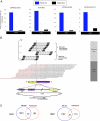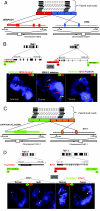Chimeric transcript discovery by paired-end transcriptome sequencing
- PMID: 19592507
- PMCID: PMC2708976
- DOI: 10.1073/pnas.0904720106
Chimeric transcript discovery by paired-end transcriptome sequencing
Abstract
Recurrent gene fusions are a prevalent class of mutations arising from the juxtaposition of 2 distinct regions, which can generate novel functional transcripts that could serve as valuable therapeutic targets in cancer. Therefore, we aim to establish a sensitive, high-throughput methodology to comprehensively catalog functional gene fusions in cancer by evaluating a paired-end transcriptome sequencing strategy. Not only did a paired-end approach provide a greater dynamic range in comparison with single read based approaches, but it clearly distinguished the high-level "driving" gene fusions, such as BCR-ABL1 and TMPRSS2-ERG, from potential lower level "passenger" gene fusions. Also, the comprehensiveness of a paired-end approach enabled the discovery of 12 previously undescribed gene fusions in 4 commonly used cell lines that eluded previous approaches. Using the paired-end transcriptome sequencing approach, we observed read-through mRNA chimeras, tissue-type restricted chimeras, converging transcripts, diverging transcripts, and overlapping mRNA transcripts. Last, we successfully used paired-end transcriptome sequencing to detect previously undescribed ETS gene fusions in prostate tumors. Together, this study establishes a highly specific and sensitive approach for accurately and comprehensively cataloguing chimeras within a sample using paired-end transcriptome sequencing.
Conflict of interest statement
The authors declare no conflict of interest.
Figures



References
-
- Mitelman F, Johansson B, Mertens F. Fusion genes and rearranged genes as a linear function of chromosome aberrations in cancer. Nat Genet. 2004;36:331–334. - PubMed
-
- Mitelman F, Mertens F, Johansson B. Prevalence estimates of recurrent balanced cytogenetic aberrations and gene fusions in unselected patients with neoplastic disorders. Gene Chromosome Canc. 2005;43:350–366. - PubMed
-
- Tomlins SA, et al. Distinct classes of chromosomal rearrangements create oncogenic ETS gene fusions in prostate cancer. Nature. 2007;448:595–599. - PubMed
Publication types
MeSH terms
Substances
Grants and funding
LinkOut - more resources
Full Text Sources
Other Literature Sources
Molecular Biology Databases
Miscellaneous

